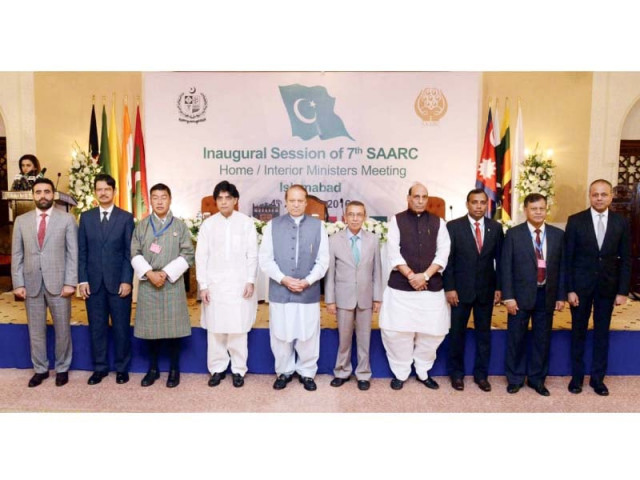SAARC ministerial moot: ‘Indian excesses in Kashmir terrorism’
Nisar says there is a difference between freedom struggle and militancy

PM Nawaz Sharif poses for a group photo with home ministers of Saarc countries. PHOTO: AFP
These comments by Interior Minister Chaudhry Nisar Ali Khan at the conference of interior ministers of South Asia Association of Regional Countries (Saarc) in Islamabad prompted his Indian counterpart Rajnath Singh and his entourage to leave the closed-door conference and immediately head back to India.
Chairing the seventh Saarc ministers meeting attended by interior ministers of India, Afghanistan, Nepal, Bhutan, the Maldives, Sri Lanka and Bangladesh, Nisar took the unprecedented step of delivering Pakistan’s statement.
“Don’t ridicule my country by hiding behind the shield of articulation,” Nisar exclaimed as he “drew the attention of Saarc member states to the use of brute force ...against unarmed civilians engaged in a struggle against foreign occupation”, without naming Kashmir or India.
The security czar called on regional countries to differentiate between terrorism and freedom movements, especially those sanctified by the UN Security Council, as he responded to Singh’s comments made earlier in the conference.
The interior minister went on to defend Pakistan’s policies stating that the country itself has been the biggest victim of terrorism as he pointed out a number of terror attacks around the country.
“Pakistan faces terrorism from across the border besides blatant interventions in our internal affairs.”
He hoped that the SAARC meeting could be a forum for “a lot of soul-searching on all sides”.
“Instead of engaging in a blame game and taking swipes at each other we should take time out to reflect and sit down together and try to work out the problems and reservations which we might have towards each other,” Nisar said.
He reiterated that Pakistan was ready to engage in any dialogue process based on mutual respect and dignity.
“It is for those who put conditions and sub-conditions for initiating dialogue to reconsider and realign their positions.”
Earlier, Singh, who was the first senior Indian minister to visit Islamabad since the Pathankot base attacks in January, took aim at Pakistan for fomenting terror in India and for praising militants in Kashmir.
“One country’s terrorist cannot be a martyr or freedom fighter for another,” he said in a thinly-veiled swipe at Pakistan for praising the 22-year-old separatist leader Burhan Wani whom Indian forces had killed in an encounter in Jammu and Kashmir last month.
“Those who provide support, encouragement, sanctuary, safe haven or any assistance to terrorism or terrorists must be isolated.”
Singh did not mention Pakistan by name but India accuses Islamabad of sheltering militants fighting against New Delhi’s rule in disputed Himalayan valley. However, Singh during a visit to Kashmir last month had directly blamed Pakistan for stoking unrest.
“If we are to rid ourselves of terrorism, we will have to genuinely believe that attempts to distinguish between ‘good’ and ‘bad’ terrorists are misleading, and thus, no type of terrorism or support to it can be justified on any grounds whatsoever.”
Later, while addressing a news conference after the moot ended, Nisar explained his uncharacteristic move of presenting the country’s statement despite chairing the conference as the host.
“As chairman, I had to make a decision and make a statement on behalf of Pakistan to correct the record on the statement made by the Indian interior minister,” he said, adding that the response became necessary after Singh had made a political statement.
Gains against terrorism
Earlier, while addressing the opening session, Prime Minister Nawaz Sharif extolled the “remarkable gains” made against terrorism during Operation Zarb-e-Azb and implementation of National Action Plan.
These gains, Nawaz said, reflected the government’s determination to eliminate the scourge of terrorism for good.
He said the interdependence of Saarc calls for joint strategies to counter terrorism, narcotics trade, cyber-crimes, and trafficking in women and children.
Later the ministers approved recommendations of Saarc interior secretaries for issuing SAARC Visa Exemption Stickers to the GS Staff working at SAARC Secretariat and that these visas will be valid for three years.
Published in The Express Tribune, August 5th, 2016.



















COMMENTS
Comments are moderated and generally will be posted if they are on-topic and not abusive.
For more information, please see our Comments FAQ